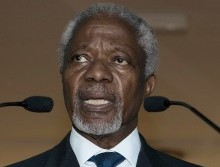The political fate of Syria could become clearer this Saturday, as major world powers will meet to discuss a transition plan for the conflict-ridden country. The plan, formulated by United Nations envoy Kofi Annan, would still need to be accepted by Syria as well. As of Thursday morning, the plan’s approach to removing President Bashar al-Assad from power has not been made public officially.
The United States, which has called for Assad to leave, has endorsed Annan’s plan to this point and will be present at Saturday’s meeting. Russia and China are considered the linchpins to global unity on the plan. While opposed to the violence in the country, Moscow and Beijing have repeatedly given varying degrees of diplomatic cover to the Assad regime.
Speaking with reporters on Wednesday in comments released by the US State Department, spokesperson Victoria Nuland said Assad has “believed that he’s had the support of China and Russia in this process.”
Nuland said that after Russia and China showed greater concern by backing Annan’s previous ceasefire plan, “now the hope and expectation is that working together on a transition plan… will make clear to Assad that he does not have a blank check from those countries anymore, and that it is time to move on. And it’ll also dishearten those who are still supporting the regime.”
Russian Stance Unclear
Nuland refused to openly say if Russia was expected to agree to Assad’s departure from power as a part of a globally-backed transition plan, saying she would not “prejudge” Saturday’s meeting.
The US, meanwhile, was cautious in how it described its vision for the future of Syria. While calling for a post-Assad Syria, US Secretary of State Hillary Clinton on Wednesday did not explicitly demand Assad step down immediately. The top American diplomat, in comments released by the State Department, said they are supporting Annan’s efforts to “prepare for a democratic transition that leads to a post-Assad Syria.”
Said Clinton of Annan’s plan, “We believe it embodies the principles needed for any political transition in Syria that could lead to a peaceful, democratic, and representative outcome reflecting the will of the Syrian people.”
She said that Saturday’s meeting “makes a lot of sense” if all the participants agree ahead of time to endorse the Annan plan and they meet “on the basis of that roadmap.”
However, Russian Foreign Minister Sergei Lavrov on Thursday denied that Moscow had already accepted Annan’s plan, according to RIA Novosti. He said the official approach to Syria to be endorsed by Saturday’s conference was still being developed.
“The fate of President Bashar al-Assad should be decided by the Syrians themselves,” RIA Novosti quoted Lavrov as saying in a press conference. He also refused Russian backing for “any outside interference or imposition of recipes” on Syria.
Bloodshed Continues
The diplomatic wrangling comes as Syria continues to be beset by violence. The Assad regime has imposed a brutal crackdown on opposition protesters that has sparked escalated attacks from those challenging his power.
On Thursday, the regime-linked Syrian Arab News Agency (SANA) reported a “terrorist” car bombing attacked the parking lot of the Justice Palace in Damascus. In addition, Amnesty International condemned Wednesday’s attack on a pro-regime television station in which journalists were killed.
The Amnesty press release said some opposition representatives claimed the attack was by members of militant opposition groups or defectors. Citing SANA, the Amnesty statement noted that three journalists and four security staff members were killed.
“Even a media organization engaged in propaganda is still a civilian object, so it and those working for it must never be deliberately targeted,” Ann Harrison, Amnesty International’s Middle East and North Africa deputy director, said in the press release.
“All parties should condemn this attack and make clear to those under their command that attacks of this nature and other such violations will not be tolerated.”
Amnesty has also been vocal in the past in condemning the regime for torturing its opponents. The Assad regime has been accused over the past year-plus of massacring women and children, shelling residential areas and other human rights abuses in a crackdown that has killed thousands.
(By Joshua Spurlock, www.themideastupdate.com, June 28, 2012)

